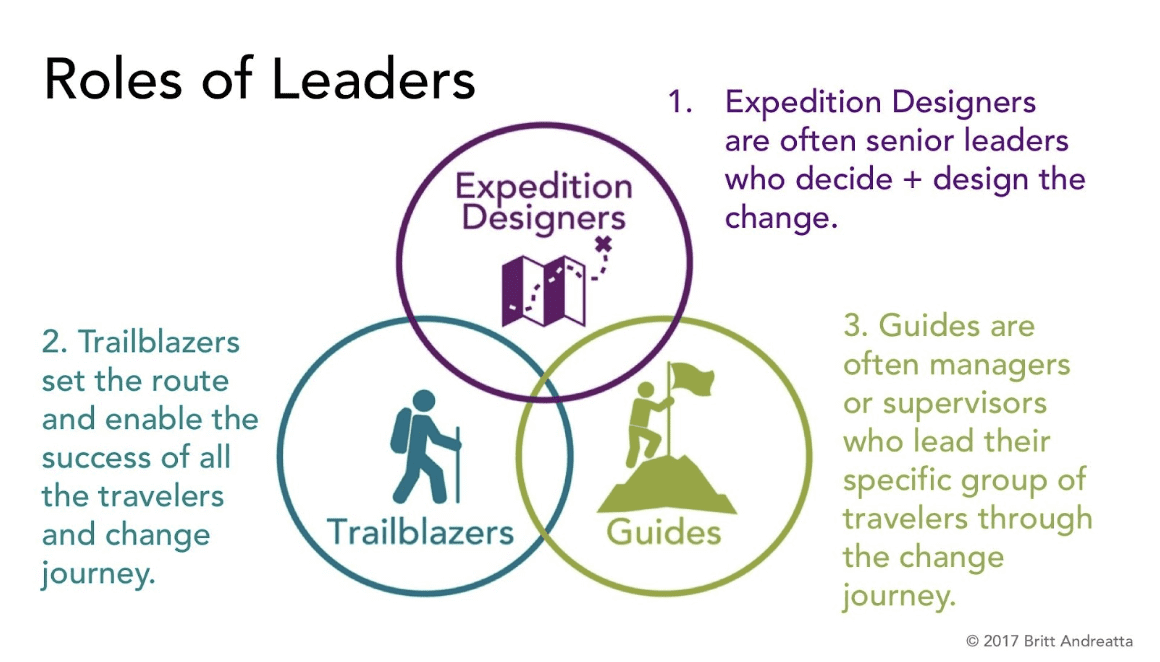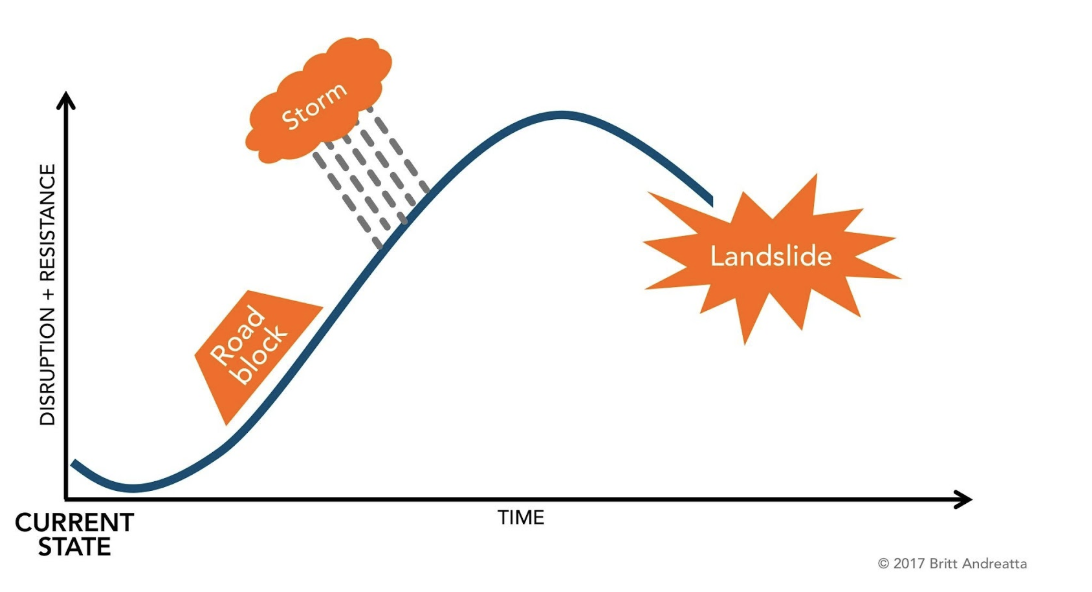Dealing with the Unexpected: Tips for Leading Change

| This is part 3 of a 3 part series on change -here is part 1 and part 2.
In reality, few (if any) change initiatives roll out as planned. Even when the senior leaders, managers, and employees all do a phenomenal job, unexpected things happen. And the best change leaders plan for the unexpected.
With our Change Quest training, you'll have the tools to account for typical issues, like what to expect when taking a highly resistant group on a long, intense climb. Or having a group of travelers who don't have the skills they need to be successful on the trail ahead of them. The model helps you assess and predict change as well as provides tools for dealing with the unexpected.
Let's explore three common sources of problems and tips for moving through them successfully.
Roadblocks
Sometimes something drops onto the change journey and prevents people from moving forward until it's addressed. Roadblocks don't affect the overall change journey, so the goal and route remain the same, but your group has to get past the roadblock, possibly climbing over it or taking a short detour. Here are some examples of roadblocks:
- A supplier is delayed in delivering a component
- The cost of a necessary resource just increased
- Another team's process or product is not yet finished
- A key player or guide leaves the team or company
- A regional difference has not been accounted for
- A key element of the rollout was not adequately prepared on time
A roadblock's impact depends on your team and timeline as well as the size of the obstacle. I think of it as a boulder on the trail. Experienced travelers who are highly motivated for the journey might handle a roadblock on their own. But if the block is large, they may need to stop and strategize the best solution for getting over or around it and sometimes need the support of managers or leaders to help remove it.
However, for highly resistant travelers or those carrying heavy loads at home or at work, a roadblock may completely demoralize the group, causing them to backslide into some negative emotions. Depending on how long it takes to resolve, a roadblock can also impact the timeline, either pushing it out so the journey takes longer, or forcing a steeper incline to catch up.
My favorite way to handle a roadblock is to turn it into a problem-solving challenge. This naturally turns on the reward-seeking part of the brain, which also counters some of the change-resistant structures like the amygdala or habenula. Have your travelers take the lead on finding the best solution as they are likely to have great ideas and will feel more empowered if they are involved in the resolution. Once you get through the roadblock, be sure to celebrate the group's success and teamwork.
Storms
The second type of unexpected challenge is like a blizzard or sandstorm. Storms are something that comes from outside the group and descends upon the journey stopping the travelers' progress. Examples of storms include:
- A new policy or regulation goes into effect that needs to be addressed by the designers/leaders
- A person or group raises concerns about the change that needs to be resolved by the designers/leaders
- A process or technology is not configured correctly and will take time to fix
- A shift occurs in the market but is likely to right itself in the near future
- A designer/leader makes a significant change that needs to be worked through
Storms cannot be resolved by the travelers or guides so require the group to hunker down and wait it out, which can stop the group's forward momentum. In addition, storms require someone else's involvement so cannot be just handled by the creativity of the guide and their group of travelers.
When a storm hits, be a calm and steady presence, talking your group through what is happening and why. The sooner you can let them know a storm is on the way, the better -your value as a guide will be less impressive if you come bounding up announcing the storm when they're already buried under two feet of snow! Giving them warning not only helps your group physically and mentally prepare, it also builds trust in your leadership.
The impact of the storm on your group really depends on how you handle it. The shared experience might bind your travelers together, but it's not unusual for added anxiety and strife to divide a group. Obviously, the former is preferred. Be transparent about what you know and how long you anticipate the storm to last, and address how this delay impacts them and whether it affects how their performance will be viewed.
In the brain, the amygdala is going to create anxiety about this change within a change. And the habenula might cause more concern about failure and blame. There is nothing more stressful to a group than being prevented from being successful but still held accountable for the result. You will likely hear a lot of questions and comments to that effect so come prepared with the answers.
Luckily, you are unlikely to be on the side of a real mountain building a shelter to withstand a snowstorm. So your travelers can probably use the storm as a break in this particular change journey to focus on their other work, especially since they may be on other change journeys too. It might be good to help them figure out how to best use their time and energy until the storm passes.
When things start up again, reconvene the group to tell them what caused the storm (if they don't already know), adjusting the map and timeline accordingly. If a long time has passed, you may need to reorient them to the goal and assess their overall motivation since things might have shifted in the interim. Don't expect them to just pop right back to where they were before. They likely need to warm up and build some momentum again. If you can, acknowledge and celebrate their adaptability.
Landslides
The final type of unexpected challenge completely wipes your group off the mountain, creating a sudden end to the change journey. These are significant shifts in the landscape that will not only affect this change journey but likely several other things about your work environment. Some examples of landslides:
- The financial collapse of your organization
- A merger or acquisition
- An election, lawsuit, or regulation
- A natural or geopolitical disaster
Landslides are the most disorienting because they create sudden, seismic shifts so your travelers will likely be stunned. They put an obvious end to this particular change journey, and launch a whole new one.
Because your travelers are likely experiencing confusion and shock, it's helpful to bring them together and maintain your role as guide. Help them understand and process this shift and allow them to ask questions. You can leverage the team's connection and your time together to create some stability around the new, bigger change that caused the landslide.
It might be helpful to share the why, if you know it, and help them see the route or map. If you don't know or can't share, let them know that more information will be coming soon and ask them to have patience. Remind them that this might be a good time to use stress-reducing tools of self-care, mindfulness, and play. If possible, organize some in-office options at work (e.g., games, meditation class, potluck) to take people's minds off the unknowns and to ensure they are taking care of themselves during this disorienting time. Again, it's important to end with recognizing and celebrating the team's accomplishments for the original change journey so that the habenula doesn't code change in general as failure to be avoided in the future.
Needless to say, understanding the impact of roadblocks, storms, and landslides help managers and leaders better prepare for leading successful change. This and many other tools are part of the Change Quest®, the science-based approach to leading change.
Related Blogs
JOIN OUR COMMUNITY
Be the first to know of Dr. Britt Andreatta's latest news and research.






